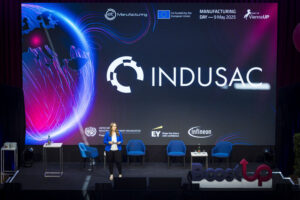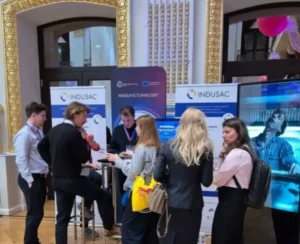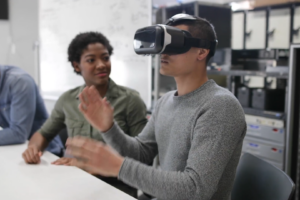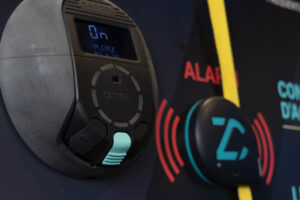
LIFE REMAR: Managed Aquifer Recharge for the Renaturalisation of Wastewater
September 25, 2025
Hydroless: Reducing water consumption in production plants through the use of artificial intelligence and digital twins
October 2, 202529/09/2025
The EU-funded Quick Challenge-Driven, Human-Centred Co-Creation Mechanism for INDUStry-Academia Collaborations (INDUSAC) project has successfully developed and validated a new, human-centred, challenge-driven co-creation mechanism that connects industry with academia across Europe. Over three years of implementation, the project has supported international teams of students and researchers in tackling innovation needs directly submitted by companies.
The INDUSAC project has created a dynamic community of industry-academia stakeholders focused on circularity, general sustainability, digitalisation and industry 4.0.
Using a dedicated digital platform and a structured methodology, INDUSAC facilitated fast, cost-effective, and inclusive collaborations between over 250 companies and academic teams.
The project lasted 3 years and featured open calls for both companies and academic teams - with multiple cut-off dates allowing companies to submit challenges and academic teams to submit motivation letters across several rounds, and compete to solve challenges of the companies.
What was INDUSAC all about?
INDUSAC set out to pilot and validate a human-centred co-creation mechanism where companies submitted innovation challenges and international teams of students and researchers tackled them within a co-creation process spanning 4 to 8 weeks, with support of the INDUSAC consortium team.
The initiative emphasised inclusiveness, especially for participants from widening countries, and was supported by a tailor-made digital platform, micro-funding, and a structured methodology.
A mechanism with two main pillars
The INDUSAC platform: set to build on pre-existing Industry-Academia Collaboration mechanisms to facilitate a user-friendly co-creation process. It provides the foundation for developing solutions that clearly process the needs and interests of companies, students, and researchers in the EU.
The INDUSAC methodology: aimed at facilitating the creation of company, student, and researcher teams by matching industry needs with students’ and researchers’ interests and skills. The methodology is built on a baseline of pre-existing co-creation approaches and offers guidance packages, as well as processes and tools for its smooth functioning. It provides detailed user journey maps.
Key results at a glance
During 3 years of lifespan of the project (from September 2022 to August 2025), INDUSAC achieved remarkable engagement and results:
- A total of 251 industry challenges were published via the INDUSAC platform.
- 232 motivation letters received from student teams.
- More than 190 students received financial support of up to €1,000 each for their participation.
- 67% of participants came from EU “widening countries,” helping to create a more balanced and inclusive innovation landscape.
- 163 completed co-creation projects.
- Over 584 students and researchers engaged in real business environments.
- 159 solutions accepted by companies.
- Average satisfaction scores exceeded 4.2 out of 5 for both the process and the platform.
- 90% of students and researchers reported an improvement in transversal and entrepreneurial skills.
- Over 91% of participants would recommend INDUSAC to their peers.
These numbers are more than just statistics. They represent meaningful learning experiences, real-world problem solving, and sustainable connections between academia and industry.
A collaborative ecosystem for the future
INDUSAC created a vibrant, pan-European community of stakeholders working across key themes such as:
- Sustainability & Circularity
- Digitalisation & Industry 4.0
- Entrepreneurial thinking & Skill development
The project not only delivered tangible solutions for companies but also empowered students with real-world experience, interdisciplinary teamwork, and enhanced career prospects.
Final event in Vienna
The project concluded with its final event, which took place on 8–9 May 2025 in Vienna, Austria, as part of the EIT Manufacturing Day. The meeting brought together over 500 participants, including representatives of companies, students, researchers, and policymakers.

During the event, the consortium presented the results achieved throughout the project, demonstrated the functionalities of the INDUSAC platform, and conducted interactive workshops focused on the future development of the co-creation mechanism. Panel discussions addressed the role of industry-academia collaboration in driving innovation and skills development.

Further details and a full photo gallery are available on the project website:
INDUSAC – INDUSAC – Two Intense Days in Vienna to Wrap Up the Project.
Consortium, Budget and Funding
Led by the Jozef Stefan Institute (Slovenia), in addition to CIT UPC, other participants in this project are Bax & Company, Innoget, the Chamber of Commerce and Industry of Pécs-Baranya (Hungary), the Bydgoszcz Tool Valley Industrial Cluster (Poland), the Karlsruher Technology Institute - KIT (Germany), the Cyprus University of Technology and EIT Manufacturing East (Austria).
With a duration of three years (2022-2024), the INDUSAC project is funded by the European Health and Digital Executive Agency (HaDEA) and is part of the Horizon Europe programme. It has been endowed with a budget of nearly €2 million.
Projectes Relacionats
- The Visualisation, Virtual Reality and Graphic Interaction Research Group (ViRVIG) at the Universitat Politècnica de Catalunya - BarcelonaTech (UPC) has participated in the XR4ED project, an initiative that connects the educational technology (EdTech) and Extended Reality (XR) sectors, with the aim of transforming learning and training across Europe.
- The inLab FIB at the UPC has collaborated with Lizcore® for the development of a proof of concept based on artificial intelligence to improve safety in climbing with autobelay devices. The system allows the automatic and accurate detection of risk situations before starting a route.
- Researchers from the Centre for Image and Multimedia Technology of the UPC (CITM) and from the DiCode research group (Digital Culture and Creative Technologies Research Group) of the Universitat Politècnica de Catalunya – BarcelonaTech (UPC) have worked on the project The Eyes of History, an initiative of the Catalan Agency for Cultural Heritage that offers an immersive view of Catalan cultural heritage. It is especially aimed at the first and second cycles of secondary education and was created to bring heritage into the classroom. Its goal is to bring the history and monuments of Catalonia closer in a vivid and innovative way, using tools such as virtual reality and new museographic narratives.
- City and Play is a social action project coordinated by researchers from the Centre for Image and Multimedia Technology (CITM) and the DiCode research group (Digital Culture and Creative Technologies Research Group) of the Universitat Politècnica de Catalunya – BarcelonaTech (UPC), the Universitat Oberta de Catalunya (UOC) and the University of Barcelona (UB), and funded by Barcelona City Council. The aim of the project is to promote civic competences and reflection on the urban environment among adolescents through the creation of an open framework that uses methodologies based on play, co-creation and storytelling.




